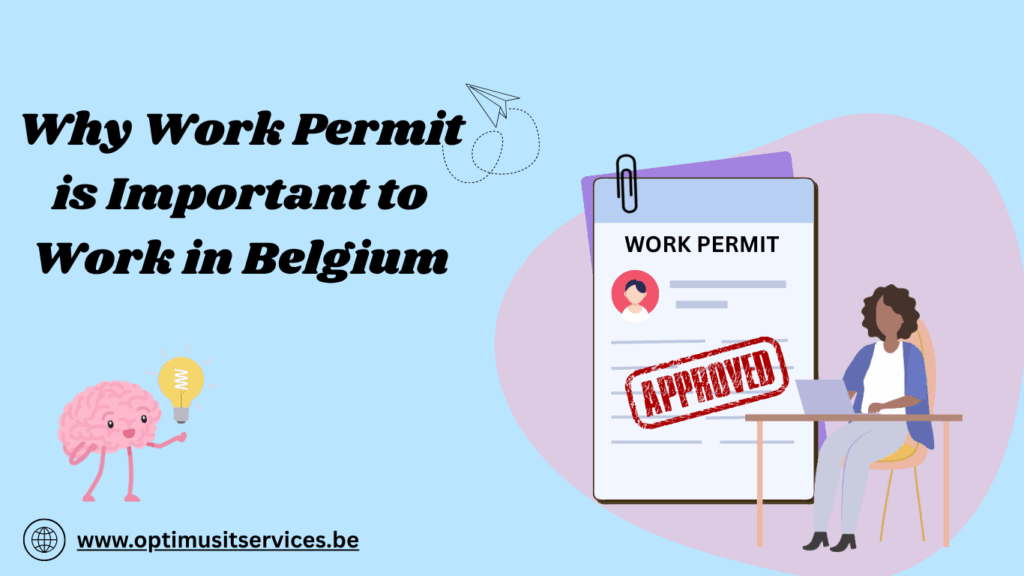Belgium is more than just waffles, chocolate, and beautiful medieval cities. It’s also a hub for international business, European politics, and a high quality of life—making it an attractive destination for professionals worldwide.
However, if you’re a non-EU/EEA citizen or not from Switzerland, there’s one thing that can make or break your opportunity to work here legally: a work permit.
It might seem like just another bureaucratic process, but in reality, it’s the legal key that unlocks everything from job opportunities to long-term residency. In this post, we’ll walk you through why getting a work permit is not just important—it’s absolutely essential.

Why Work Permit is Important to Work in Belgium
1. It’s the Law: Work Without a Permit and You Risk Serious Trouble
Let’s start with the basics: working in Belgium without a valid work permit is illegal. And the consequences are not light.
For You (the Employee):
- You risk hefty fines, deportation, and even a ban from re-entering Belgium or the Schengen Area.
- Your career prospects in Europe could be damaged permanently.
- You’ll have no legal protection if things go wrong with your employer.
For Employers:
- Hiring someone without a permit can result in major fines, legal action, and damage to their business reputation.
- Most employers simply won’t take the risk of hiring someone without the correct documentation.
In short: a work permit protects both you and your employer. It’s your proof that you’re allowed to work and that you’re doing it the right way.
2. No Work Permit = No Job Offers
Unless you’re covered by an exemption (such as being a highly-skilled worker in a critical sector), Belgian employers legally cannot hire you without a valid work permit.
That means even if you have an impressive resume, top qualifications, and glowing references—your job application likely won’t even be considered without that permit.
Having a work permit says:
- “I’m eligible to work in Belgium.”
- “I’m a serious candidate.”
- “You don’t have to worry about hiring me legally.”
It’s your entry ticket into the Belgian job market. Without it, you’re stuck outside the door.
3. It Gives You Legal Rights and Workplace Protections
Getting a work permit isn’t just about legality—it’s also about your safety, your dignity, and your future.
With a valid work permit, you are entitled to the same rights as any legally employed person in Belgium:
- Fair pay and compliance with minimum wage laws
- Safe working conditions
- Paid holidays and regulated working hours
- Access to healthcare and social security benefits
- Protection against unfair dismissal
- The right to join trade unions
Working without a permit often means working under-the-table—no contracts, no benefits, and no real protection. You’re far more vulnerable to exploitation, abuse, or sudden job loss.
4. It’s the First Step Toward a Stable Future in Belgium
A valid work permit isn’t just about today—it’s your foundation for tomorrow.
Here’s why:
- After a few years of legal employment, you may become eligible for long-term residency or even Belgian citizenship.
- Your time spent working legally counts toward residency requirements.
- You’ll have a documented history of contributing to society, which strengthens your application for permanent stay or family reunification.
Without a legal work record, your chances of staying long-term are slim to none.
5. You Contribute to the Belgian System—and That’s a Good Thing
When you work legally in Belgium, you’re part of something bigger.
- You pay taxes that support schools, roads, and public services.
- You contribute to the social security system, which helps others—and supports you in case of illness or unemployment.
- You’re seen as an active, engaged member of society, not an outsider trying to cut corners.
That kind of contribution builds trust, opens more opportunities, and helps you truly integrate into Belgian life.
So, Is a Work Permit Really That Important?
Absolutely. It’s not just a legal formality—it’s a non-negotiable requirement for building a stable, fulfilling life in Belgium.
To sum it up, a work permit:
- Keeps you legally protected
- Opens doors to employment
- Ensures your rights as a worker
- Builds a foundation for permanent residency or citizenship
- Shows you’re serious about contributing to society
Final Thoughts: Make It a Priority
Yes, the process might be complex. Yes, it might take time. But investing the effort to secure your work permit is investing in your future.
Make sure you:
- Research the right type of permit for your situation (Single Permit, Type B, etc.)
- Work with potential employers who are willing to sponsor or guide you
- Consider professional help if needed—it’s worth it for your peace of mind
At the end of the day, getting that work permit means you’re not just visiting Belgium—you’re building a life here.
Need help navigating the work permit process? Visit us at www.optimusitservices.be for personalized guidance and support. Let’s make your Belgian dream a reality—legally, securely, and confidently.

